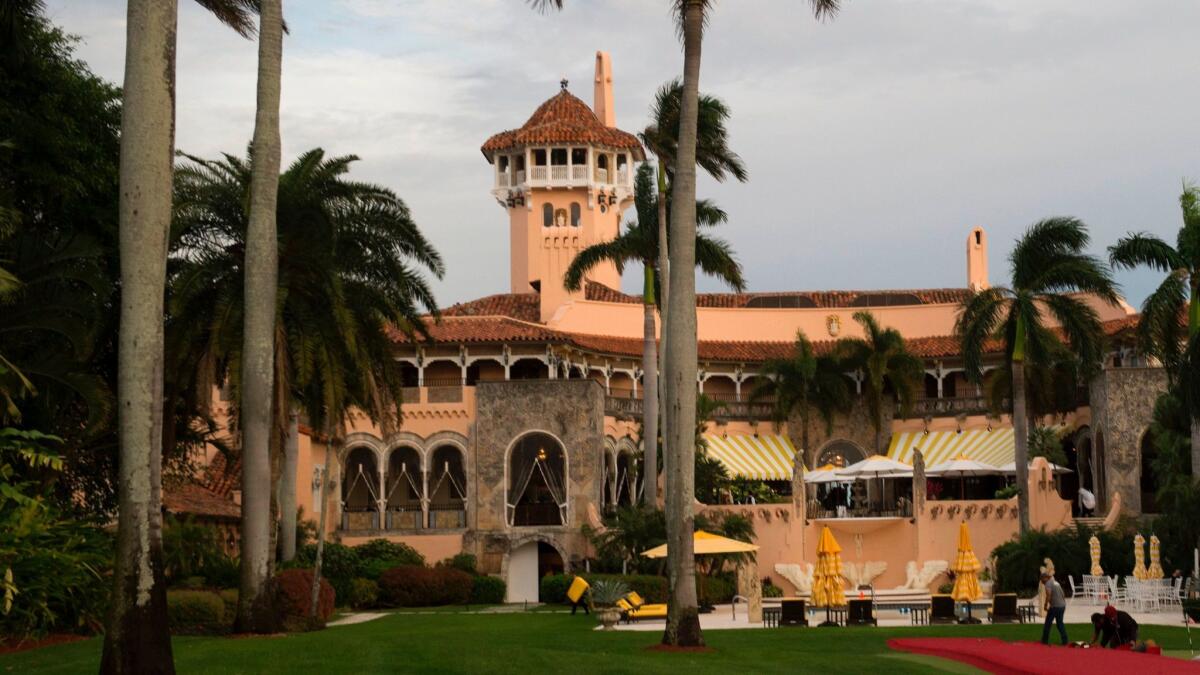Federal officials order 15,000 new visas for low-wage workers

- Share via
The Department of Homeland Security on Monday announced a one-time increase of 15,000 additional visas for low-wage, seasonal workers for the remainder of this fiscal year, a seeming about-face from President Trump’s “Hire American” rhetoric.
The action followed heavy lobbying from the fisheries, hospitality and other industries that rely on temporary foreign workers.
The increase represents a 45% bump from the number of H-2B visas normally issued for the second half of the fiscal year, said senior Homeland Security officials in a call with reporters Monday.
The visas are for workers taking seasonal jobs in the seafood, tourism and other industries — but not farm laborers. Farm workers enter the U.S. under a different visa, known as the H-2A.
Businesses must first attest that their firms would suffer permanent “irreparable harm” without importing foreign workers, and they will be required to retain documents proving that they would not otherwise be able to meet their contractual obligations, the officials said.
The officials said the government made the decision after “considering the interest of U.S. workers” and has created a tip line for reports of worker exploitation and abuse.
Homeland Security Secretary John F. Kelly “first and foremost is committed to protecting U.S. workers and strengthening the integrity of our immigration system,” one of the officials said.
Congress paved the way to increasing the number of H-2B workers in May when it passed an omnibus budget to avoid a government shutdown. Part of the deal included giving the Homeland Security chief the authority to increase the number of foreign workers, after consulting with the secretary of Labor, “upon determination that the needs of American businesses cannot be satisfied in fiscal year 2017 with United States workers who are willing, qualified, and able to perform temporary nonagricultural labor.”
Current law limits the number of such visas issued to 66,000 a year — split among two halves of the year. The cap has already been reached this year. Visas for more than 120,000 positions have been requested so far in fiscal 2017, according to Department of Labor statistics. And the seafood industry, which began its hiring season in April, competes with other industries, such as landscaping and tourism, that rely heavily on temporary summer workers.
Businesses’ petitions will be reviewed on a first-come, first-served basis, and granted without regard to industry type, geographic location or firm size, the officials said. Given that the summer is half over and that normal processing time takes 30 to 60 days, the officials recommended that businesses pay the $1,225 fee for expedited processing within 15 days.
The H-2B program has drawn strong bipartisan support in the past because lawmakers have a vested interest in supporting their states’ most critical industries — whether it’s crab-picking in Maryland, ski resorts in Colorado or logging in Washington. But some senators are criticizing their colleagues’ efforts to bypass public debate about changing immigration law.
Other critics dispute that there really is a labor shortage in the industries that rely most on the seasonal guest worker visas, accusing the industries of exploiting foreign workers at the expense of American jobs.
“This is yet another example of the administration and Congress failing to keep the Trump campaign promise of putting American workers first,” said Roy Beck, president of NumbersUSA, which lobbies to lower immigration levels.
Some of Trump’s closest allies on immigration on Capitol Hill have called for cuts to the H-2B program, citing the president’s campaign as evidence that American workers are opposed to increases in temporary, low-skilled workers from abroad.
In May, Sen. Tom Cotton (R-Ark.) gave a blistering speech on the Senate floor opposing a measure in the omnibus spending bill that authorized the doubling of H-2B visas that could be issued during the remainder of fiscal 2017.
“A lot of the arguments for this kind of program boil down to this: No American worker will do that job. That is a lie. It is a lie. There is no job that Americans will not do,” Cotton said. “If the wage is decent and the employer obeys the law, Americans will do the job. And if it’s not, they should pay higher wages. To say anything else is an insult to the work ethic of the American people who make this country run.”
Cotton and Sen. David Perdue (R-Ga.) are working on an immigration bill that would, over the coming decade, slash by half the current number of 1 million foreigners each year who received green cards allowing them to live permanently in the United States. The senators met twice with Trump on the bill, and Cotton said in a recent interview that the president supported their efforts but also asked them to address temporary workers. The senators are working closely with the White House on a new version of the legislation that could be unveiled by the end of summer.
Trump himself has used the visas to hire temporary workers at his Florida golf resorts in Palm Beach and Jupiter.
“I’ve hired in Florida during the prime season — you could not get help,” Trump said during a 2015 primary debate. “Everybody agrees with me on that. They were part-time jobs. You needed them, or we just might as well close the doors, because you couldn’t get help in those hot, hot sections of Florida.”
More to Read
Inside the business of entertainment
The Wide Shot brings you news, analysis and insights on everything from streaming wars to production — and what it all means for the future.
You may occasionally receive promotional content from the Los Angeles Times.










